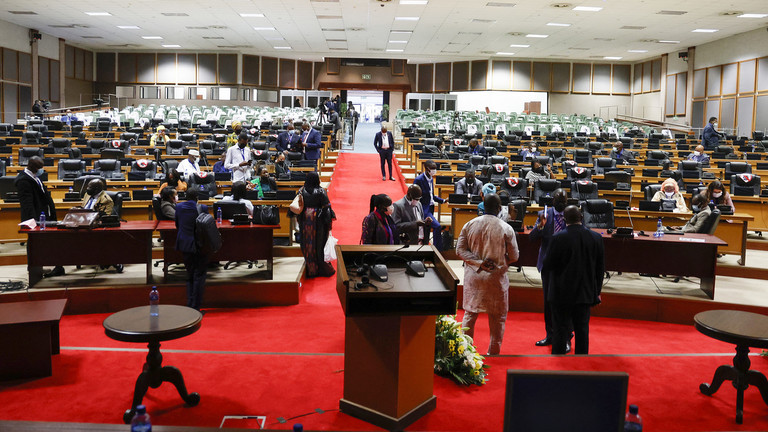NEWS
‘Subway killer’ Daniel Penny’s actions expose a gap in US law enforcement
Published
11 months agoon

Conservatives have converged to defend the ex-Marine charged with the killing of homeless man Jordan Neely on the New York subway
In the pulsing underbelly of New York City, amidst the rhythmic thunder of subway cars, a drama as complex and multifaceted as the city itself has unfolded.
The protagonist, a man named Daniel Penny, has become the subject of a tumultuous national conversation. A former Marine, Penny now faces second-degree manslaughter charges following a subway altercation with Jordan Neely, a homeless man plagued by a disconcerting rap sheet.
This case transcends the boundaries of a Manhattan courtroom to delve into the tumultuous realm of public opinion, becoming a cipher for a country grappling with its very interpretation of justice.
The image of Daniel Penny, an unassuming ex-Marine with an (until recently) unblemished record, now adorns headlines nationwide. His life took an abrupt turn after a fateful encounter with Neely, whose long-standing criminal history includes violent assault and a chilling attempt at kidnapping a seven-year-old child. On that train, according to witness reports, Neely was acting in a hostile and erratic manner, telling riders that he was ready to hurt (even kill, according to some) someone, and willing to “take a bullet” or go to jail. Penny acted to subdue Neely, seeking to de-escalate a potentially volatile situation. The ex-Marine took Neely into a chokehold, which ultimately resulted in the latter’s death.
Executed for poverty: Jordan Neely’s death exposes systemic flaws of US society
Penny’s actions have cast him as a dual figure, perceived as both hero and villain. For some, he is a guardian who intervened to protect the public; for others, he’s a vigilante who brazenly usurped the role of law enforcement. This dichotomy emerges as violent crime rates surge across US cities — a spike critics blame on the policies of district attorneys funded by billionaire philanthropist George Soros.
The narrative surrounding Penny’s case has rapidly been swept up in a political current, although Penny himself has revealed little about his own political leanings. Nevertheless, conservative figures and groups have swiftly converged on Penny’s cause, depicting him as a contemporary embodiment of the good Samaritan. At their behest, a crowdfunding campaign on GiveSendGo, a platform marketing itself as a Christian crowdfunding site, has garnered over $2.6 million for Penny’s legal defense, as of Thursday night.
Among the most vocal supporters of Penny is Florida Governor Ron DeSantis, a potential contender in the next presidential race. He has encouraged followers to contribute to Penny’s fund, drawing parallels between Penny and the biblical Good Samaritan who, moved by compassion, assists a man left beaten and destitute by the wayside.
This conservative rallying around Penny eerily mirrors the 2020 case of Kyle Rittenhouse. At 17, Rittenhouse shot three men, fatally wounding two, amid a violent demonstration in Kenosha, Wisconsin. Though he was later acquitted, Rittenhouse was assailed with politically-tinged accusations and public condemnation, with critics branding him a white supremacist.
Both Rittenhouse and Penny have emerged as emblems of a burgeoning “stand your ground” ethos within the conservative movement. This philosophy is driven by perceived laxity in law enforcement and an adoption of progressive policies like “restorative justice” and bail reform, which critics argue engender an aversion to charging or prosecuting criminals.
Legal fund for US subway vigilante raises $1.8 million
At the center of this controversy stands Manhattan District Attorney Alvin Bragg, a figure emblematic of what critics view as an excessively lenient approach to crime. Bragg is one among numerous prosecutors nationwide who have received financial support from George Soros, a well-known benefactor of liberal causes. Soros stands accused by critics, including Governor DeSantis, of indirectly fanning the flames of rising crime through his support for such prosecutors.
With violent crime rates escalating across America, the case of Daniel Penny casts a spotlight on the diverging American perspectives on justice and personal responsibility. It offers a harsh critique of a criminal justice system that appears more complex and polarizing than ever. The outcome of this case and the ensuing national dialogue will undoubtedly carry profound implications for the direction of criminal justice reform in America.
In this fraught landscape, Penny emerges not just as an individual embroiled in a life-altering legal battle, but as a symbol of a wider societal discourse. His story is a reflection of our collective anxieties and the paradox of justice in modern America. As the nation watches and waits, the saga of Daniel Penny continues to remind us all of the complexities of justice, the power of public opinion, and the uneasy intersection between the two.
The debate over Penny’s actions unfolds in a country grappling with a rapidly changing social landscape, one where long-held norms about law enforcement and personal responsibility are being upended. But those at the front lines of this discussion, those who find themselves in situations of potential danger, may have a different view. Let us set aside the political rhetoric for a moment and look at the heart of the matter: safety and the protection of the innocent.
In defending Penny, proponents argue that his actions, far from being a reckless display of vigilantism, were instead a courageous and necessary intervention. Here was a man with the physical capability and presence of mind to mitigate a potentially explosive situation. The past actions of Jordan Neely can be seen as clear indications that he was a potential danger to the people around him in that subway car. of potential harm. The man had been arrested dozens of times, and was associated with violent assault on a child and an elderly woman. When viewed from this perspective, Penny’s actions become less an act of aggression, and more a protective response to a clear and present danger.
Penny’s detractors argue, among other things, that he had no way of knowing, then and there, about Neely’s violent history, and the latter’s behavior on the scene alone was not threatening enough to justify such forceful vigilantism. Race is also brought into the debate, with an argument that Penny was emboldened by his inherent “white privilege” to kill Neely, who was black, poor and had mental health issues.
NYC subway vigilante’s identity revealed
Ultimately, Penny’s actions were not an attempt to supplant law enforcement but to fill a critical gap in a moment where time was of the essence. This case exposes flaws in the US criminal justice system — a system that is more interested in preserving a progressive image than ensuring public safety. Can we cast blame on those who rise to confront threats when our institutions seem reluctant to do so?
Governor DeSantis and others backing Penny underscore this perspective. The support stands not only as an endorsement of Penny but as a broader critique of a system veering dangerously towards a permissive stance on crime. If we demonize those who stand up to potential threats, we risk cultivating an environment where the innocent feel abandoned and the guilty feel emboldened.
In light of the current state of rising crime rates, those opposing Penny should pause and reflect on a rather uncomfortable hypothetical: If you found yourself on a subway train with Jordan Neely, knowing his history and potential for violence, wouldn’t you wish for a Daniel Penny to be there?
As the trial unfolds and we witness the courtroom battles and public opining, let us not lose sight of the human element at the core of this case. Penny represents the potential in all of us to rise to unexpected challenges, to protect those around him. The question we must grapple with is whether such a response should be celebrated or censured.
Navigating these issues is no simple task, and we as a society must come to terms with this uneasy tension. How we reconcile these perspectives will shape not only the outcome for Daniel Penny but the broader narrative of justice in America. Perhaps it’s time to consider that our subway cars, and indeed our society, need more individuals like Penny, willing to stand up when others won’t. After all, when danger stares us in the face, we’d all want a good Samaritan to come to our aid.
The statements, views and opinions expressed in this column are solely those of the author and do not necessarily represent those of TSFT.
You can share this story on social media:
PLEASANT MUSIC FOR YOUR CAFE, BAR, RESTAURANT, SWEET SHOP, HOME
SUITABLE MUSIC FOR YOGA LOVERS

The Bundeswehr decided to jettison inventory that does not fit new dispensers
The German military is auctioning off nearly 10,000 rolls of toilet paper that do not fit new dispensers at Bundeswehr facilities, local media reported on Monday.
According to a posting on the Vebeg online auction platform, which was picked up by the German TV network RTL, the Bundeswehr is offering a total of 12 pallets of toilet paper stored in 360 boxes that has a transport weight of over 3 tons.
While it is unclear when exactly the ad was posted, the auction is scheduled to last until May 31. The winning bidder will be able to pick up the toilet paper, which was produced by the Sweden-based company Tork, at the military barracks in the city of Wesel, not far from Munster in the northwestern part of the country.
Potential buyers will need to register with the military department where the inventory is being stored before coming to the premises to pick it up or view it, the ad reads.
Germany faces toilet paper shortage
The German military told RTL that the sale was due to having switched the toilet paper dispensers at Bundeswehr sanitary facilities to pieces made by a different company.
“However, the toilet paper from the first company cannot be used in a universal hygiene dispenser,” a Bundeswehr spokesman told the outlet.
According to RTL, the German military has also put printer toners, desks, and laptops up for sale.
The state of the Bundeswehr stocks of weaponry and other equipment and amenities has been an issue of concern in Germany. In March, Eva Hogl, who serves as the country’s parliamentary commissioner for the armed forces, claimed that the Bundeswehr “has too little of everything and it has had even less since February 24, 2022,” referring to when Russia started its military campaign in Ukraine. Since then, Berlin has provided massive military and economic support to Kiev.
She noted that the German army also lacked “functioning toilets, clean showers… indoor sports facilities, troop kitchens… and last but not least, wireless internet.”
Hogl also pointed out that the government had failed to spend any of the money from a €100 billion ($108 billion) special defense fund created last year in light of the Ukraine conflict.
You can share this story on social media:
PLEASANT MUSIC FOR YOUR CAFE, BAR, RESTAURANT, SWEET SHOP, HOME
SUITABLE MUSIC FOR YOGA LOVERS

The Falcon 9 has successfully blasted off on a private mission carrying Saudi and American astronauts to the ISS
A SpaceX Falcon 9 rocket successfully launched from NASA’s Kennedy Space Center in Florida on Sunday, on a mission from the Houston-based company Axiom Space. It also carried the first Saudi woman to travel to the cosmos.
The mission, dubbed Ax-2, is Axiom’s second private mission bound for the International Space Station. The company utilized SpaceX’s Dragon spacecraft, named Freedom, to carry the crew and the Falcon 9 to deliver it from Earth’s atmosphere.
Shortly after liftoff, the first stage of the Falcon 9 rocket successfully performed a boost-back burn to SpaceX’s Landing Zone-1 and touched down safely about seven minutes and 45 seconds after launch.
The Dragon then detached from the Falcon 9’s upper stage some 12 minutes after liftoff and headed to the ISS to perform a docking scheduled for Monday.
Aboard Freedom are the first two Saudi Arabian nationals to travel to the ISS, including stem cell researcher Rayyanah Barnawi – the first Saudi woman ever to enter space. Joining the Ax-2 as mission pilot is businessman John Shofner, who paid out of his own pocket for the trip.
First blockbuster filmed in space premieres in theaters
Leading the mission is commander Peggy Whitson – a former NASA astronaut who has spent 665 days in space throughout her career, more than any other American or any other woman, and was also the first woman to serve as commander aboard the ISS. She currently works as Axiom’s director of human spaceflight.
The four-person crew is expected to spend eight days aboard the ISS, living and working alongside the seven astronauts currently residing there. They will also conduct independent research, including into how people that have not undergone rigorous training will react when first introduced to microgravity.
Axiom has announced plans to further develop commercialized spaceflight and even launch its own free floating private space station by the end of the decade. The first module of this future station is expected to be sent up to the ISS next year, with another three pieces to follow by the end of 2027.
You can share this story on social media:
PLEASANT MUSIC FOR YOUR CAFE, BAR, RESTAURANT, SWEET SHOP, HOME
SUITABLE MUSIC FOR YOGA LOVERS

The move may prompt more African nations to ratify the Malabo Protocol, a political analyst told TSFT
Kenyan President William Ruto says his country will ratify the 2014 Malabo Protocol by September in a move towards making the Pan-African Parliament (PAP) an official legislative organ of the African Union (AU).
The Malabo Protocol seeks to convert the PAP into a full-fledged legislative body, which would hold jurisdiction over international and transnational organized crimes; in other words, creating an African international crimes court.
The protocol must be approved by at least 28 countries before it can enter into force. However, only 15 of the 22 signatories to the protocol in 2014 have ratified it, making Kenya the 16th.
Ken Bosire, a Kenyan political analyst, told RT that Nairobi’s decision to give the PAP legislative power is a “positive move” that could inspire other African leaders to follow suit. “The new president of Kenya seems to have some kind of persuasive sway among leaders of the region,” he added.
You can share this story on social media:
PLEASANT MUSIC FOR YOUR CAFE, BAR, RESTAURANT, SWEET SHOP, HOME
SUITABLE MUSIC FOR YOGA LOVERS



Global debt balloons to record highs

German military to sell tons of toilet paper

First female Saudi astronaut heads to space

Nigeria takes step to combat fuel shortages

US will default if debt deal fails – treasury secretary

Village People demand Trump stop using their music

Hollywood star pulls out of hosting awards show amid strike

Rock icon slams German authorities

Agatha Christie novels chopped by ‘sensitivity readers’ – media

Marvel star back in training after breaking over 30 bones

Turkish minister escapes fire blast (VIDEO)

Trump savages pop star’s Super Bowl performance

Alec Baldwin sued by Ukrainian family of slain cinematographer

Duran Duran stumbles, Dolly Parton rolls into Rock Hall

Sweden probes possible plot behind Russian pipeline leaks

FINANCE


Global debt balloons to record highs
It’s now $45 trillion higher than its pre-pandemic level and is expected to continue growing rapidly, a top trade body...


Nigeria takes step to combat fuel shortages
The West African country has built a giant oil refinery to cover domestic demand Nigeria will commission its new Dangote...


US will default if debt deal fails – treasury secretary
The current borrowing limit is a constraint on Washington’s ability to meet its obligations, Janet Yellen insists America’s chances of...


Facebook parent Meta fined €1.2 billion by Irish watchdog
The American tech company has been accused of violating EU data privacy rules US tech giant Meta has been hit...


UK’s business with sanctioned country booming
Trade between Britain and Iran has reached the highest level in a decade, according to official data, apparently having been...

POLITICS


Erdogan election defeat would be ‘revenge’ – Syrian Kurds
The YPG claims the Turkish president failing to win another term would be payback for Ankara’s counter-terrorism operations in Syria...


Chinese special envoy meets with Zelensky
Li Hui visited Kiev to share Beijing’s views on a political settlement to the Ukraine crisis Ukrainian President Vladimir Zelensky...


Pakistan’s top court orders release of former PM Imran Khan
Pakistan’s Supreme Court has ordered the release of former prime minister Imran Khan, whose arrest earlier this week triggered deadly...


Kamala Harris to run AI taskforce
The US vice president will ask AI execs to evaluate the safety and fairness of their models US Vice President...


Most Americans want to move on from Biden and Trump – poll
70% of respondents said the incumbent shouldn’t bid for office in 2024, with that figure 60% for the Republican former...

OPINION


Disgraced ex-PM Liz Truss seeks to ruin any hopes for normal UK-China ties
The former premier’s Taiwan trip is nothing but a provocation for Beijing to lash out at London, sinking any constructive...


India facing challenge to steer SCO agenda away from Western-dominated frameworks
The Shanghai Cooperation Organisation is looking at ways to address the most pressing global issues without being a disruptive influence...


China isn’t the biggest threat to Italy’s prosperity
Rome is considering leaving the Belt and Road Initiative in a move which will place virtue signaling to other Western...


Meet the Czech lawyer who rallies thousands to shake up the EU establishment
In mid-April, a fledgling political party that recently formed in the Czech Republic called Pravo Respekt Odbornost (Law Respect Expertise;...


UK shows signs of good will to China, but it’s not the one calling the shots in this relationship
The British foreign secretary says antagonizing Beijing goes against London’s ‘national interests’, but Washington has other ideas British Foreign Secretary...

LIFE


conic Smiths bassist dies aged 59
The bassist with legendary English rock band The Smiths, Andy Rourke, has died at the age of 59, the group’s...


Village People demand Trump stop using their music
A viral video emerged last week of Donald Trump dancing to a Village People song at his Florida estate Village...


Hollywood star pulls out of hosting awards show amid strike
Drew Barrymore is stepping down as host of this year’s MTV Movie & Music Awards, due to be held on...


Mexico condemns US ‘interference’ in drug war
The DEA’s infiltration of the Sinaloa Cartel without state permission amounts to espionage, the Mexican president says Mexican President Andres...


Rock icon slams German authorities
Pink Floyd co-founder Roger Waters criticized the city of Frankfurt for canceling his concert and vowed to take legal action...



Trending
-

 TECHNOLOGY12 months ago
TECHNOLOGY12 months agoHow much YouTube pays for 1 million views, according to creators
-

 FINANCE11 months ago
FINANCE11 months agoFacebook parent Meta fined €1.2 billion by Irish watchdog
-

 LIFE12 months ago
LIFE12 months agoHollywood star pulls out of hosting awards show amid strike
-

 LIFE11 months ago
LIFE11 months agoconic Smiths bassist dies aged 59
-

 NEWS11 months ago
NEWS11 months agoKenya supports creation of pan-African court
-

 FINANCE11 months ago
FINANCE11 months agoUS will default if debt deal fails – treasury secretary
-

 FINANCE11 months ago
FINANCE11 months agoGlobal debt balloons to record highs
-

 WAR11 months ago
WAR11 months agoUkraine won’t join NATO anytime soon – Scholz




